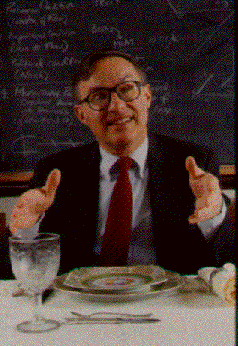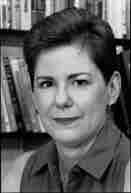 A well-mannered animal: How we eat, says Leon Kass, reveals our human uniqueness.
A well-mannered animal: How we eat, says Leon Kass, reveals our human uniqueness.
 A well-mannered animal: How we eat, says Leon Kass, reveals our human uniqueness.
A well-mannered animal: How we eat, says Leon Kass, reveals our human uniqueness.
Leon Kass begins The Hungry Soul with a warning to his readers: "You have picked up a strange book." Subtitled Eating and the Perfecting of Our Nature, the work, published this past summer by the Free Press, is hard to pigeonhole as anthropology, physiology, or philosophy. But if strange means unnatural, then Kass' readers may find the caveat undeserved. What, after all, could be more natural a topic than eating?
Yet the meaning of eating here is more than meeting biologic necessity. Eating, Kass argues, is integral to our sense of community, family, even morality-and to our ties with other living creatures. The marvel of this "strange" subject is, perhaps, that for all the time we spend eating, we rarely consider its deeper implications.
Are there connections, he wonders, be-tween human intelligence and our bodies' upright and omnivorous design, or between our omnivorousness and a need for morality? Why do humans, unlike other animals, voluntarily refrain from eating certain foods-beginning with the taboo against eating human flesh? And what is the meaning behind the customs of eating, like the elaborate rules for using utensils? More importantly, do such manners repress or elevate our nature?
Over lunch in his Harper office, Kass, SB'58, MD'62, the Addie Clark Harding professor in the College and the Committee on Social Thought, says that he began his inquiry hoping to "build some kind of bridge between these customs and our understanding of nature and of human nature." The result is "a book which ought to be a model for moral philosophers," said the Times Literary Supplement. "[Kass'] message and his example are of the first importance."
The nine-year effort answers a challenge that Kass raised in an earlier book, Toward a More Natural Science: Biology and Human Affairs. Kass, who trained as a physician at Chicago and a biochemist at Harvard, argued in that volume for "a richer kind of biology" and anthropology, one not at odds with everyday experience. Such a science could address the ethical question he feels the modern era has neglected: How should people live their lives? The Hungry Soul doesn't offer a definitive answer. But Kass shows how, unlike popular obsessions with what we eat, a thoughtful attitude toward why, how, where, and with whom we eat can forge a link between the humanist's and scientist's worlds.
A scholar of bioethics, he made such a bridge in his own professional life in 1970, when he left the laboratories of the National Institutes of Health for what was to be a one-year appointment assisting a study of life science and social policy. That work led to positions at St. John's College, Georgetown, and, in 1976, on Chicago's faculty, where he describes himself as a humanist. A winner of the Quantrell award for excellence in undergraduate teaching, he has taught courses on science and ethics; on the Bible, Aristotle, Rousseau, and Darwin; and in the humanities and social sciences Common Core.
To Kass, the customs of eating at tableside transform a utilitarian, animal activity-"mere fueling"-into a human endeavor. Contrast a meal wolfed down while standing in the kitchen, or take-out food eaten in front of the TV, to the edifying potential of the sit-down family meal: "All kinds of things are inadvertently taught at the table without having to moralize about them," he says. "One learns self-restraint, sharing, consideration, taking turns, and the art of friendly conversation. One sees that someone else has worked hard for one's sustenance."
These lessons of family and friendship, he argues, have as their prerequisite customs like table manners. Manners serve not just to prevent disgust but also to create a "veil of invisibility," freeing diners of the awkward awareness that eating is an animal activity requiring the taking of life.
"We really do try to keep hidden the necessarily violent and destructive foundation of eating," says Kass. Most cultures, he believes, use utensils at meals to create a "psychic distance" between food and its source. For example, before there were forks, people "used to lift meat to the mouth with a knife. First the knife became single-edged, then they rounded off the tip and made the edge blunt. There are also taboos about lifting the knife to the mouth and even using the knife on certain kinds of foods.…"
Some reviewers of The Hungry Soul have noted that a discussion of table manners may seem mere dieter's fare to a reader starved for ethical guidance. Table etiquette, though, is only part of the book's much broader argument, which builds from the animal nature of eating to its purely human and social aspects. Beyond that, Kass sees a still higher custom: the sanctification of food through ritual. Jewish dietary laws, explored in the book's final chapter, both acknowledge the eater's place among, and one's debt to, other creatures, and express a reverence for the divine. "Food is ours not because we merit it," he says. "Religious rituals celebrate the mysterious source of the splendid world and its hospitality in providing food, both for life and for thought."
Kass is quick to note that, for many, meals today are often neither civilized nor civilizing. Our "spiritual anorexia," he says, is the price we pay for a utilitarian attitude about eating: a hunger for connections to the people and world around us. But, as he sits eating a bagel, facing his guest at an office table cleared of papers and books, he suggests that even small gestures-deliberately stopping the day's work to eat, if only a simple meal-can express "an awareness of the deeper meaning of what we're doing. And that's good," he adds. "Otherwise one simply slips into thoughtlessness."-A.C.
Amid this debate, a new study sheds light on just how prevalent PMDD's symptoms really are. Sarah Gehlert of the School of Social Service Administration and Shirley Hartlage of Rush-Presbyterian-St. Luke's Medical Center looked for women with the disorder using psychiatric evaluations and daily checks of mood, behavior, and hormone levels. The researchers aimed to avoid the biases of previous studies-some of which excluded racial minorities or informed subjects of the study's purpose. Of 93 women, they found that, depending on how symptoms were measured, 1.1 to 8.6 percent met the criteria for PMDD. That incidence is far lower than earlier estimates-and not far from the 3- to 5-percent rate predicted by the APA.
 Sizing up PMDD: Gehlert
Sizing up PMDD: Gehlert
 For a cancer patient, infection, not the cancer itself, is sometimes the biggest danger. Bone-marrow transplants restore the immune defenses knocked out by intense chemotherapy, but the solution isn't always quick enough: Transplanted "stem" cells from bone marrow or blood can take more than two weeks to repopulate marrow and mature into different cell types, including infection-fighting white blood cells. Associate professor of medicine Stephanie Williams, AB'77, MD'81, is testing a new method that could cut this high-risk time to as little as three to five days, leading to safer-and cheaper-bone-marrow transplants. Working with Baxter Healthcare Corporation, Williams heads a trial of the technique on 20 women with metastatic breast cancer. The method combines conventional "autologous marrow transplants"-in which a patient's own cells are removed and frozen prior to chemotherapy-with new technology for separating out the stem cells and stimulating some of them to multiply and mature in the laboratory (see photo). Returned to the patient after chemotherapy, these cells begin to function almost immediately. Williams says the treatment, which could help fight leukemia, lymphoma, and other cancers, should eventually make bone-marrow transplants an outpatient procedure.
For a cancer patient, infection, not the cancer itself, is sometimes the biggest danger. Bone-marrow transplants restore the immune defenses knocked out by intense chemotherapy, but the solution isn't always quick enough: Transplanted "stem" cells from bone marrow or blood can take more than two weeks to repopulate marrow and mature into different cell types, including infection-fighting white blood cells. Associate professor of medicine Stephanie Williams, AB'77, MD'81, is testing a new method that could cut this high-risk time to as little as three to five days, leading to safer-and cheaper-bone-marrow transplants. Working with Baxter Healthcare Corporation, Williams heads a trial of the technique on 20 women with metastatic breast cancer. The method combines conventional "autologous marrow transplants"-in which a patient's own cells are removed and frozen prior to chemotherapy-with new technology for separating out the stem cells and stimulating some of them to multiply and mature in the laboratory (see photo). Returned to the patient after chemotherapy, these cells begin to function almost immediately. Williams says the treatment, which could help fight leukemia, lymphoma, and other cancers, should eventually make bone-marrow transplants an outpatient procedure.